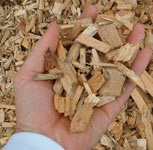

UK: The Office of Fair Trading has been asked to bring its review of the domestic fuel market forward, looking at long-term alternative sources of energy for remote off-grid communities. The answer for many, says Simon Holden, co-founder of Euroheat, could be wood.
“It’s been a bad few months for oil customers – the cost of oil has been rising steadily, with a government watchdog set to investigate accusations of fuel companies profiteering by charging inflated prices during the Big Freeze," Mr Holden said.
"Prices soared by more than 50% per cent in some instances, while the actual cost of heating oil only rose by 10%. It wasn’t just the cost either; thousands of homeowners froze due to delays in oil deliveries.
"As the majority of people relying on oil live in rural locations, for many, wood could provide a cost-effective and environmentally friendly solution.
"For property owners with managed woodland nearby then wood and woodchip are the cheapest fuel options. Wood can either be fed into a boiler in log form, delivered as chip, or chipped on site. Space is very important; there must be room for the boiler and associated equipment, plus fuel needs to be stored and kept dry.
"Wood pellets have a higher price than chip or logs but are viewed as a more convenient fuel – pellets have an ash content of as low as 0.5%, meaning ash trays need to be emptied less often and they take-up less storage space than timber in its natural form.
"While the price of pellets was comparable to oil, the recent price-hikes are making pellets a cheaper solution. When the Renewable Heat Incentive (RHI) comes into play the cost will reduce to way below fossil-fuel counterparts.
"Off-mains customers; don’t spend another expensive winter in the cold, consider switching to wood and ensure you can keep warm sustainably, long-after fossil fuels have run out.”